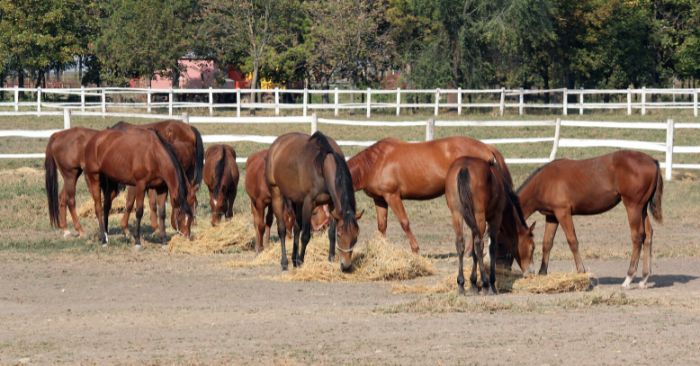Horses can eat straw, but it should only be used as bedding material and not as a main source of nutrition. Horses can safely consume straw, but it is important to note that it should not be their primary source of food.
While straw is low in nutritional value, it can be used as bedding material in stalls to provide comfort for horses. Feeding horses a diet consisting mainly of straw can lead to nutrient deficiencies and health issues. It is crucial for horses to have a balanced diet that includes high-quality forage, such as hay or grass, supplemented with grains and other necessary nutrients.
Proper feeding practices and consultation with a veterinarian or equine nutritionist are key to ensuring the health and well-being of horses.
Why Horses Are Often Fed Straw
Horses are often fed straw due to a few reasons. Firstly, straw is a cost-effective and widely available feed option. Secondly, horses have a natural instinct to forage and chew, and straw provides a fibrous material that fulfills this need.
Additionally, straw can be used as bedding material in horse stables, making it convenient for horse owners. Moreover, straw has a low nutritional value, which can be beneficial for horses who need to maintain a healthy weight or restrict their calorie intake.
However, it is important to note that straw should not be the sole source of nutrition for horses, as it lacks essential nutrients. Therefore, it is recommended to supplement straw with high-quality hay or concentrate feeds to ensure a well-balanced diet for horses.
Nutritional Value Of Straw For Horses
Straw can be a viable option as horse feed due to its nutritional content. It contains fiber, which aids digestion. Comparatively, straw has lower protein and energy levels than other common horse feed options. However, it can provide bulk to their diet and help maintain a healthy weight.
The high fiber content in straw stimulates the digestive system and prevents health issues like colic. Additionally, it can be beneficial for horses that are prone to overeating or have certain medical conditions. While straw is not a complete diet, it can be used as a supplement or forage substitute when necessary.
Overall, when considering the nutritional value of straw for horses, it is important to evaluate it in comparison to other feed options and consult with a veterinarian to ensure a well-balanced diet.
Potential Risks And Limitations Of Feeding Straw To Horses
Feeding straw to horses can lead to potential digestive issues and health complications. The fibrous nature of straw may cause impaction or blockage in the horse’s gastrointestinal tract, resulting in discomfort and potential colic. Straw lacks the necessary nutrients and energy that horses require for optimal health and performance.
It is low in protein, vitamins, and minerals, which are essential for their overall well-being. Additionally, horses may consume large amounts of straw due to its low nutritional value, leading to weight loss and inadequate nourishment. It’s important to provide horses with a balanced diet that includes high-quality forage and appropriate concentrates to meet their nutritional needs.
Consulting with a veterinarian or equine nutritionist is advisable to ensure horses receive the proper diet for their individual requirements.
Alternatives To Straw For Horses
Exploring alternatives to straw for horses is crucial for their overall health and well-being. It is important to consider recommended feed options that provide both safety and nutrition. One viable option is hay, which offers horses essential fiber and nutrients.
Another alternative is pelleted feed, which provides a more concentrated source of nutrition. Complete feeds are also worth considering, as they contain a balanced blend of vitamins, minerals, and fiber. Additionally, for horses with specific health conditions, such as dental issues or metabolic disorders, soaked feeds or forage cubes can be beneficial.
Remember to consult with a veterinarian or equine nutritionist to determine the most suitable option for your horse’s individual needs. Taking the time to explore and provide healthier alternatives to straw can significantly contribute to your horse’s overall well-being.
Ensuring Proper Diet For Horses
Creating a well-rounded and nutritionally complete diet for horses is essential for their optimal health. When it comes to balancing a horse’s diet, there are several important factors to consider. Firstly, it is important to provide a good quality forage such as hay or pasture to meet their fiber requirements.
Additionally, incorporating a balanced concentrate feed that contains essential nutrients such as protein, vitamins, and minerals is necessary. Moreover, it is crucial to ensure that the horse has access to plenty of fresh and clean water at all times. In addition, providing salt and mineral blocks can help meet their mineral requirements.
Another important consideration is to avoid sudden changes in the horse’s diet as it can lead to digestive upsets. Furthermore, regular consultations with a veterinarian or equine nutritionist can help determine the specific dietary needs of each individual horse. By following these guidelines, horse owners can ensure that their horses have a well-balanced and nutritious diet for their overall well-being.

Credit: www.thehaypillow.com
Conclusion
It is important to understand the dietary needs of horses when considering whether they can eat straw. While straw can be used as bedding or forage, it should not be relied upon as the sole source of nutrition for horses.
While it may provide a source of fiber, it lacks the necessary nutrients for a balanced diet. Instead, horses should primarily be fed a diet consisting of good quality hay or pasture, along with appropriate amounts of grains or concentrates and access to fresh water.
If straw is used as bedding, it is important to regularly monitor the horse’s intake to ensure they are not consuming excessive amounts. By providing horses with a well-rounded diet and carefully managing their access to straw, their overall health and well-being can be supported.
